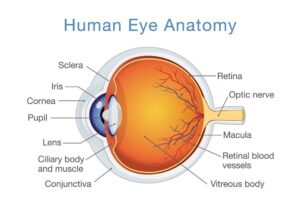What Is a Macular Pucker?

Macular pucker, also known as an epiretinal membrane, is a wrinkle of the macular tissue that can affect central vision. The position of the macula is important to its function; it must lie flat against the back of the eye to work properly. If it wrinkles, creases or puckers, it can cause a distortion in central vision.
Causes of a Macular Pucker
Most macular puckers occur due to age-related changes in the vitreous, which is the gelatinous substance filling the eye. In a young, healthy eye, the vitreous is loosely attached to the retina and when it moves, it does not pull or tug on the retina. With age, the consistency of the vitreous changes, and it can stick to certain portions of the retina. If the vitreous tugs or pulls on the retina, it can create microscopic areas of damage; in response to the damage, the retina forms scar tissue. A contraction of scar tissue over the macula causes a wrinkling or bulging that doctors recognize as a macular pucker.
The effects of a macular pucker vary by person; some do not experience any noticeable effects on vision. But for others, a macular pucker can cause significantly distorted vision.
If you are experiencing changes to your central vision, it could be because of a macular pucker. The team at Berks Eye Physicians & Surgeons invites you to schedule a consultation to confirm or rule out a macular pucker and discuss your treatment options.
Macular Pucker Symptoms

- Blurry or distorted vision
- Straight lines or objects appear wavy
- Decline in the ability to read small print or discern fine details
- Gray areas or blind spots in central vision
Risk Factors for Macular Pucker
The biggest risk factor for macular pucker is age. Adults over the age of 60 are most likely to get macular puckers. Sometimes macular pucker is associated with traumatic eye injury, previous eye surgery or problems with the blood vessels in the retina.
Prevention
Unfortunately, it is not always clear why macular puckers happen and therefore, there is no way to prevent them from occurring.
Diagnosing Macular Puckers
The Berks Eye Physicians & Surgeons team diagnoses macular puckers through comprehensive eye exams. Imaging tests with optical coherence tomography are also performed to get an in-depth look at the retina and macula.
Macular Pucker Treatment Options
The recommended treatment for a macular pucker depends on how badly it affects vision. Small puckers that do not significantly impair vision may be monitored over time to ensure they do not change and start causing problems.
Problematic macular puckers are treated with vitrectomy surgery. During a vitrectomy, the surgeon removes the vitreous from the eye to access the retina and macula. The scar tissue causing the macular pucker is also removed, so the macula can resume its normal position lying flat against the back of the eye.
Request an Appointment Today
Prompt professional attention is critical for the best chances at recovering good vision after a macular pucker. If you are experiencing symptoms of a macular problem, or you have already been diagnosed with a macular pucker, we invite you to schedule a consultation at our practice to discuss your options. Our retinal specialist, Dr. Guri Bronner, has advanced training in the diagnosis and treatment of macular puckers and will provide comprehensive, personalized care for your case.
Call or email us today to request an appointment.
 1802 Paper Mill Road, Wyomissing, PA 19610
1802 Paper Mill Road, Wyomissing, PA 19610

